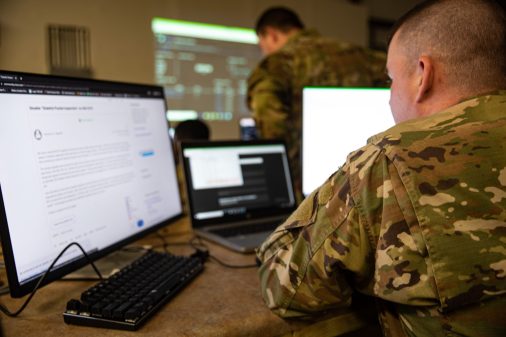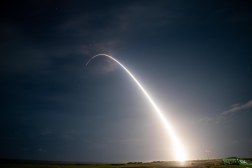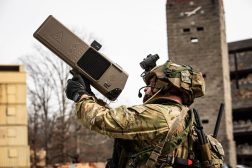Nominee vows to wield, assess and potentially enhance Indo-Pacom’s information capabilities

The officer tapped to lead U.S. military forces in the Pacific region pledged to use information tools and work with other government agencies to maximize information-related capabilities as a means of beating back a growing threat from China.
The comments come from Adm. Samuel Paparo, who was nominated by President Joe Biden to be the next commander of Indo-Pacific Command. Indo-Pacom will be at the forefront of countering Chinese activities that Washington opposes, including efforts to weaken U.S. influence and coerce other nations.
Paparo currently serves as the commander of Pacific Fleet, giving him requisite experience and knowledge in the region.
In written answers to senators’ questions as part of his confirmation process last week, Paparo vowed to utilize the power of information and integrate it into U.S. military operations.
“Information-related capabilities are critical in combating malign behavior. USINDOPACOM has a broad mix of information-related capabilities, including military information support operations and military deception operations, which are designed to change an adversary’s attitudes and behaviors. When employed effectively and in coordination with other U.S. government stakeholders, these capabilities provide USINDOPACOM opportunities to enhance U.S. national security interests,” he wrote.
“We must also employ information-related capabilities to transparently bring attention to malign behavior, such as the United States and our partners publicly releasing video of coercive and risky [People’s Liberation Army] intercepts of our lawfully operating ships and aircraft. If confirmed, I will assess current information-related capabilities and consider all viable options to improve our information operations posture and readiness,” he added.
In recent years, adversaries have sought to exploit the information environment through disinformation, misinformation, information ops and other activities as a means of undermining U.S. and allied interests without having to confront them in direct military conflict.
The Department of Defense has sought to play catch-up of sorts, releasing updates to doctrine and strategy — and the services themselves issuing their own guidance within the information realm.
The DOD has also shifted its mindset in recent years to a stance of perpetual competition. Adversaries have viewed conflict on a continuum while the U.S. has traditionally viewed it as a binary state of either war or peace. The Joint Concept for Competing, released last year, formally recognizes that the department is engaged in a competition on a daily basis below the threshold of all-out conflict.
Information is an important tool in this realm.
Paparo told senators he plans to use information in a similar vein as other organizations have in the past, disclosing and exposing problematic behavior.
“It is critical that we continue highlighting malign [People’s Republic of China] activities in the information environment,” he said. “The PRC’s militarization in the region and aggressive activities are unlawful and destabilizing. PRC actions threaten the sovereignty of our allies and partners, limit freedom of navigation, and undermine regional stability.”
A few years ago, the U.S. came to the conclusion that exposing adversary activities — be it by releasing malware samples they use, declassifying videos of their actions, or other methods — was a key way to beat back their malevolent efforts. Through public release, the hope was to shame these actors and reveal their tactics so organizations could develop countermeasures.
Relatedly, a playbook used at the outset of Russia’s invasion of Ukraine in February 2022 could also be applied in the Pacific region to help aid Taiwan in the event of Chinese military action against the island. Paparo said the declassification of sensitive intelligence could be an important tool to thwart Beijing.
The U.S. intelligence community declassified and released to the world troves of intelligence to undercut Russia’s narrative that it wasn’t massing troops or planning to invade Ukraine — a tactic many officials believe was successful and something that is likely here to stay.
“[W]e learned how the timely sharing of previously classified intelligence with our partners and the public revealed Russia’s imminent plans for an attack and helped spur the international community to act in support of Ukraine. Timely transparency can be an effective tool to counter aggression,” Paparo said. A similar tactic could be used to expose China’s activity towards Taiwan, he added, suggesting he could provide more details to lawmakers in a classified setting.
The admiral also recognized that information capabilities — as well as the military — are tools within the broader scope of the government, requiring tight linkages with other departments and organizations.
“Competing with the PRC requires strengthening, aligning, and strategically employing all elements of national power. We must tirelessly and purposefully compete in economic, diplomatic, military, and information spaces to be effective against the PRC,” he wrote. “DoD efforts throughout the information environment cross traditional department and agency lines. I fully recognize the military represents only one tool of national power. We must be fully integrated within the whole of government to maximize our collective information related capabilities.”






